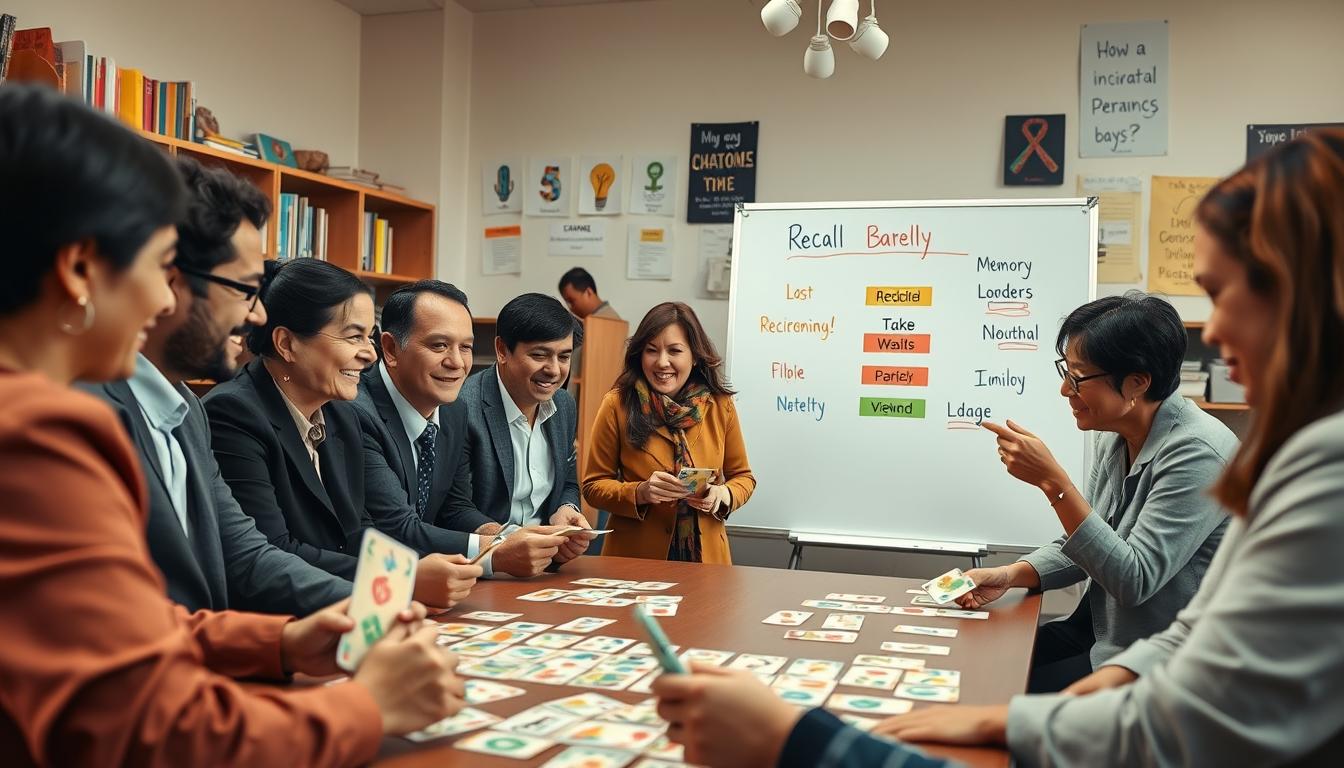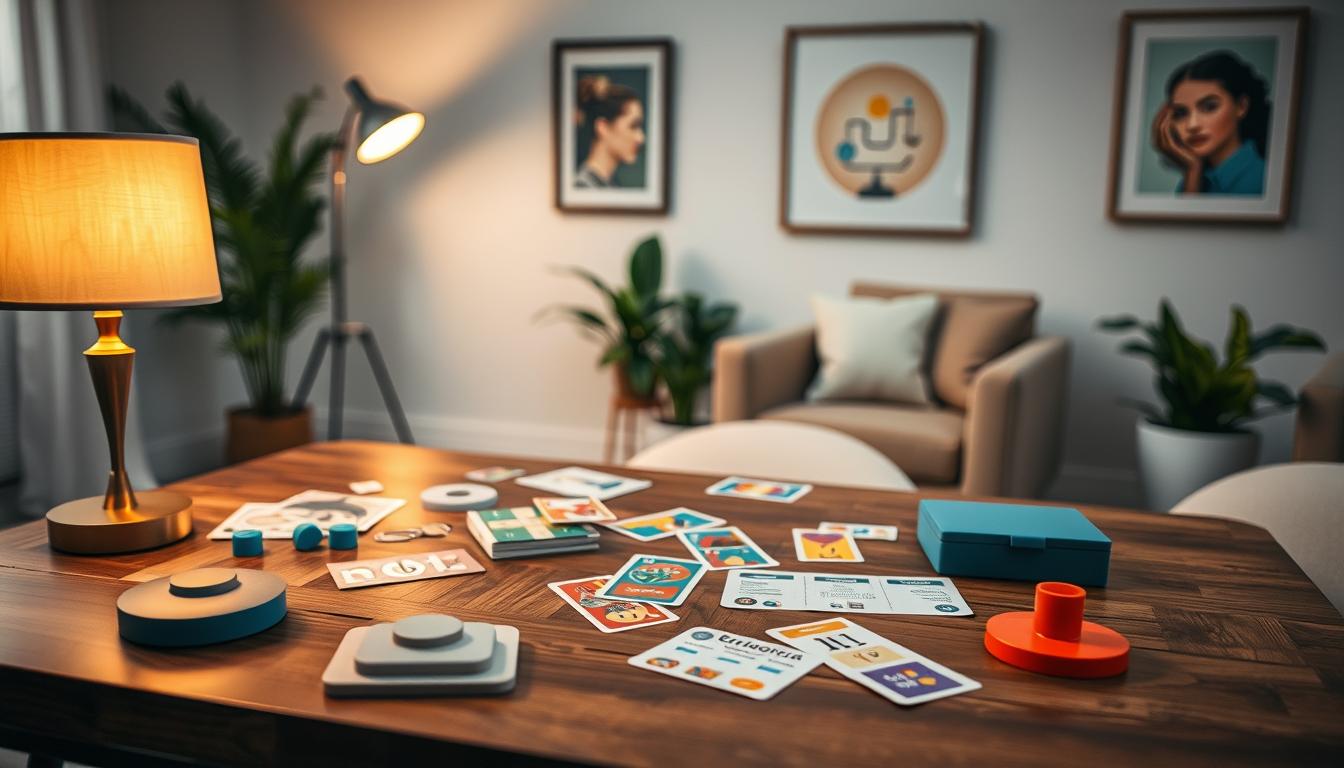Games that prevent cognitive decline in older adults
Can playing games really protect your brain as you get older? With nearly 5.8 million people in the U.S. fighting Alzheimer’s, we need effective ways to prevent it. Studies show that keeping your mind active every day can help keep your brain sharp as you age.
We will look at different brain games that can help. These games aim to improve memory and keep your mind quick. Let’s explore how they can help older adults stay mentally sharp.
Understanding Cognitive Decline in Aging
Cognitive decline means our mental abilities get worse, making everyday tasks harder. As we get older, our brains change in structure and function. Studies show these changes start around 60, raising the risk of dementia and Alzheimer’s.
Our genes play a big part in how likely we are to get these diseases. But, our lifestyle choices like exercise, diet, and staying connected also matter a lot. Our environment and health can speed up or slow down aging and dementia.
Knowing how cognitive decline works helps us find ways to prevent or slow it down. Doing things that challenge our minds, staying healthy, and keeping strong social ties can help. These actions can improve our mental health and make aging better.

The Importance of Mental Stimulation for Seniors
Mental stimulation is key for older adults’ brain health. It helps keep the brain sharp by making new connections. Studies show it can slow down brain aging, making it very important for seniors.
Doing activities that need focus and concentration boosts problem-solving skills. It also helps keep memories strong. Regular mental challenges keep the brain healthy and make seniors feel accomplished.
Keeping older adults mentally active helps them connect with others. This fights off loneliness. It’s good for both their minds and their social lives, helping them age well.
| Activity Type | Benefits for Cognitive Function |
|---|---|
| Brain Games | Enhance logical thinking and memory |
| Reading | Improves comprehension and vocabulary |
| Social Clubs | Fosters communication and team skills |
| Creative Arts | Encourages problem-solving and self-expression |

How Games Can Enhance Cognitive Function
Games are key in boosting cognitive function. They offer challenges that keep the brain active. Playing regularly can improve memory, attention, and thinking skills.
Playing games can make new connections in the brain. This helps improve cognitive abilities. Both old and new games can help, especially with regular play.
Games require players to solve problems and think fast. This sharpens the mind and makes it more resilient. Playing games as we get older can help our brains stay sharp.
Types of Games to Keep the Mind Active in Old Age
As people get older, playing different games is key to keeping their minds sharp. Games that challenge the brain are not just fun. They help keep the mind active, which is vital for staying mentally healthy. Word games and number puzzles are especially good for older adults.
Word Games and Puzzles
Word games like crosswords and scrabble are great for the brain. They help improve memory and vocabulary. Playing these games regularly can make talking and writing better.
Number-Based Games
Games like Sudoku and logic puzzles are great for solving problems. They make you think deeply and remember things better. Playing these games often helps keep your brain strong as you age. Mixing word and number games is the best way to keep your mind sharp.
Crossword Puzzles: A Timeless Classic
Crossword puzzles are great for improving cognitive health. They offer a mental challenge that boosts memory retention. Players must remember words and concepts, which helps keep the brain sharp.
Studies show that doing crossword puzzles regularly can help slow down memory loss. In fact, it can even delay cognitive decline by several years. This makes them a great choice for seniors who want to keep their minds active.
But crossword puzzles are more than just fun. They also improve critical thinking and problem-solving. Each puzzle tests knowledge and encourages creative thinking. This makes them perfect for anyone looking to boost their mental agility.
Sudoku and Number Puzzles: Strengthening Cognitive Skills
Sudoku and number puzzles are more than just fun. They help boost cognitive skills when played regularly. Players use pattern recognition and logical thinking, which are key for brain health. Studies show that those who solve puzzles often have brains that work like those eight years younger.
Adding Sudoku to your daily life can improve attention and memory. It also sharpens reasoning skills. The process of solving puzzles stimulates different parts of the brain. This makes puzzles a great way to keep your mind sharp as you get older.
These games also give a feeling of achievement and happiness when you finish them. Whether you play alone or with others, Sudoku and puzzles help you stay connected while keeping your mind sharp.
Computerized Brain Training Games
Computerized brain training games are becoming popular as tools to improve thinking skills in older adults. They use digital platforms to work on memory, attention, and solving problems. People look for fun ways to keep their minds sharp as technology grows.
Potential Benefits of Digital Games
Research shows that these games can boost executive function, speed, and memory. Older adults can challenge their minds and maybe slow down brain aging. Even short daily play can show real improvements in certain thinking skills.
Limitations and Considerations
However, there are downsides to using these games. Some studies are unsure if the benefits last. It’s also important to keep playing to see if the games really help over time. Before counting on them, users should think about these points.
Three-Dimensional Video Games: A Modern Approach
Three-dimensional video games are a new way to help older adults improve their thinking. Studies show that playing these games boosts memory by making it more fun and engaging. The games also help players learn their way around, which keeps the brain active.
Many people have seen big improvements in their thinking skills after playing for a little while. This shows that 3D video games can really help keep the brain healthy. They offer fun challenges that also help keep the mind sharp, which can slow down memory loss.
Board Games: Social Interaction and Cognitive Benefits
Board games are great for older adults because they mix social interaction with brain work. Games like chess and Monopoly make players think ahead, remember things, and talk to others. This helps a lot with cognitive health.
A study found that playing board games slows down brain aging in people aged 70 to 79. It shows how important memory and talking skills are during games.
Playing board games also helps people connect with each other. Players chat and share stories, which makes them feel better. This social part fights off loneliness and keeps the brain sharp.
Card Games: Engaging the Mind with Strategy
Card games are a fun way to keep your mind sharp. Games like Bridge and Solitaire make you think ahead and remember cards. They boost your brain’s functions.
Playing card games can also improve memory and thinking in older adults. They’re great for keeping your mind active. Plus, they help you make friends and stay alert.
| Card Game | Key Cognitive Benefits | Skills Developed |
|---|---|---|
| Bridge | Memory enhancement | Teamwork, strategic planning |
| Solitaire | Problem-solving | Logical reasoning, attention |
| Pinochle | Critical thinking | Strategic thinking, math skills |
| Rummy | Social interaction | Pattern recognition, memory |
Playing these games can make your mind more agile and fun. They’re not just games; they’re a way to keep your brain sharp.
Dice Games: A Fun Way to Boost Cognitive Activity
Dice games mix chance and strategy, making them fun and good for older adults’ brains. Games like Yahtzee and Liar’s Dice help with quick thinking and planning. These skills are key to keeping the mind sharp.
Studies show that playing dice games can improve math skills. Players learn to calculate scores and guess outcomes. This boosts their ability to think and solve problems.
Some top dice games and their benefits are:
- Yahtzee: It promotes fast thinking and weighing risks with its scoring system.
- Liar’s Dice: It boosts social skills and mental flexibility through bluffing.
- Farkle: It challenges players to calculate points and plan each roll.
Playing dice games regularly can be both fun and good for the brain. Adding them to social events can bring joy and mental challenges.
Additional Activities for Cognitive Health
Older adults can greatly improve their cognitive health by trying different activities. Games are fun and challenge the mind, but other activities are also key. They help keep the mind sharp in many ways.
Reading books sparks the imagination and boosts critical thinking. Learning a new skill, like music or a language, grows the brain. Arts and crafts improve creativity and fine motor skills, which are vital for brain health.
Physical activity is crucial for cognitive health. Mixing physical activity with mental challenges can improve brain function. Dancing, yoga, or walking can enhance well-being and stimulate the mind.
Here’s a list of activities that support cognitive health:
| Activity | Description | Benefits for Cognitive Health |
|---|---|---|
| Reading | Exploring different genres and topics. | Enhances vocabulary, imagination, and critical thinking skills. |
| Learning a New Skill | Enrolling in classes or workshops. | Promotes neuroplasticity and cognitive agility. |
| Arts and Crafts | Engaging in creative projects. | Improves fine motor skills and reduces stress levels. |
| Physical Activities | Participating in dancing, yoga, or walking. | Boosts blood circulation to the brain and enhances mood. |
Trying a variety of activities can greatly improve cognitive health. It leads to a more fulfilling and active life.
Conclusion
Playing different types of games and doing mental activities is key for older adults to keep their minds sharp. Each game, like word puzzles, number games, online games, and board games, has its own benefits. These activities together help keep the brain healthy.
While we can’t stop cognitive decline completely, playing games daily can improve mental skills. Games for seniors offer brain challenges and help people connect with others. This makes life more enjoyable and fulfilling.
By focusing on brain health through games, seniors can age better. Making games a regular part of life helps manage cognitive decline. It’s a great way to stay active and enjoy the benefits of a sharp mind.
FAQ
What is cognitive decline and how does it affect older adults?
Cognitive decline means losing mental skills like memory and thinking. It makes daily tasks hard for older people. It’s linked to aging and diseases like Alzheimer’s, affecting many in the U.S.
Why is mental stimulation important for seniors?
It keeps their minds sharp and helps grow new brain cells. Activities that challenge the mind can slow down decline. This improves life quality.
How can games benefit cognitive health in older adults?
Games boost skills like memory and problem-solving. Playing regularly can lower dementia risk. They’re key for brain health in seniors.
What types of games are best for keeping the mind active in old age?
Many games are good, like word puzzles and Sudoku. There are also computer games, board games, and card games. Each type challenges the brain in different ways.
How do crossword puzzles specifically help with cognitive decline?
Crosswords can slow down memory loss by up to 2.5 years. They help strengthen memory and may help those with mild cognitive issues.
What benefits do number-based puzzles like Sudoku provide?
Sudoku improves pattern recognition and problem-solving. Regular players can match younger adults in cognitive skills. It’s a great brain workout.
Can computerized brain training games effectively enhance cognitive functions?
Yes, they target various brain functions. They can boost memory and speed. But, consistent play is needed for lasting benefits.
What advantages do three-dimensional video games offer for cognitive health?
They enhance memory through immersive play. They stimulate brain areas for navigation. Short-term play shows cognitive gains, benefiting older adults.
How do board games contribute to cognitive enhancement in seniors?
Games like chess require strategy and memory. They help slow down decline and foster social interaction. They’re good for mental and emotional health.
What role do card games play in maintaining cognitive function?
Games like Bridge boost critical thinking. Studies link regular play to better memory and reasoning in seniors. They’re vital for cognitive training.
How do dice games promote mental agility in seniors?
Games like Yahtzee mix chance and strategy. They improve decision-making and cognitive flexibility. They’re fun ways to keep the mind sharp.
Are there other activities recommended for cognitive health beyond games?
Yes, reading, learning new skills, and arts and crafts are great. Combining physical activity with mental challenges is best for brain health. It’s a holistic approach to wellness.














